
When somebody passes away, there are many different things which need to be done before their estate can be properly distributed to the necessary people. One of these is to apply for probate. This article is going to talk a bit more about what probate is, the probate application process and how digital assets work when passed on in a will.
What Is Probate?
Throughout England and Wales, probate is the word which is usually used in order to describe the legal and financial process which is involved when dealing with a deceased person’s assets such as property, money and possessions. The probate process means proving that a Will is valid and also confirming that the person in question has the necessary authority in order to administer the estate of the deceased. Before anyone is able to transfer, sell or distribute any of the assets which are contained within the will, they will need to apply for a grant of probate.
What is a Grant of Probate?
So, what is a grant of probate? A grant of probate is a legal document which is needed so that the executor is able to access the various assets which make up the deceased’s estate, as well as clear debts that the deceased might have owed before passing away. It’s worth noting that the document will only ever be called a grant of probate if the deceased has a valid will in place, if not then it will be called a grant of letter of administration. Both of these documents work in the same way, simply giving legal authority so that the executor is able to deal with the estate of the individual who has passed away.
Digital Assets in a Will
When putting together a Will, people tend to think about physical assets such as their house and possessions; however, as a society, we have a lot more digital assets as well so these need to be factored into the Will. These can include the likes of eBooks, online photo albums and loyalty points. People are also purchasing parts of the internet now with the likes of crypto and NFTs becoming popular. So, how can these be factored into a Will?
What Are Digital Assets?
If you are going to include digital assets within your Will then it is important that you fully understand what digital assets are. They are anything that can be stored digitally and that comes with a right to use. Some of these assets can have sentimental value like an email address, social media account or cloud storage. There could also be digital assets that have monetary value such as cryptocurrency and online accounts like PayPal.
Not All Digital Assets Can Be Passed On
It is worth noting that not every digital asset you have access to you will be able to pass on as you might not actually own it. A lot of digital assets like social media accounts and streaming services aren’t owned by you, they are owned by the company that provides the service and then you just licence it. Many people believe they can just leave their login details to their executors but this will be a breach of the terms of passing the account details to another party. The same applies to the pin number which is attached to your debit card.
People should check the terms of the business they licence with in order to better understand what they can include in their will and what might happen upon their death. Some digital assets that you are more than likely going to be able to pass on are things which you have purchased, downloaded and which are stored digitally, this includes the likes of films, music collections and TV shows.
Passing On Digital Assets
So, what are some of the best ways that you can effectively pass on a digital asset? It depends on what you are trying to pass on, one of the most common are assets which have monetary value. These include the likes of:
- Cryptocurrency
Given this is a monetary asset, it’s easy to simply include it in your Will. That being said, you should make sure that the right steps are in place so that they can be accessed, and this is where leaving instructions in your Will can get a little bit complicated. In order to access crypto, you need to have access to the private key, but this can’t be shared with anyone, including anyone in your Will, for security reasons. A good idea could be to leave step-by-step instructions for a safety deposit box.
- PayPal
It’s possible for you to get money from a PayPal account after the owner of the account has died. PayPal will take instructions from the executor of the estate, so a grant of probate will be needed in order to prove that the executor has the ability to act on behalf of the deceased. Once that has been proven, PayPal is able to send a cheque in the name of the deceased account holder, alternatively, they could transfer it back to the bank account which is linked to the PayPal account.
- Loyalty Points
Passing on loyalty points varies depending on what company they are for. The Tesco Clubcard and Nectar points can be transferred quite easily but then there are other schemes where it’s harder to get in touch with the company, or the company will simply not allow the points to be transferred.
Do You Need Help with Probate?
Navigating probate can be quite tricky and as such, if you need assistance with the best way to proceed then you should be sure to contact experts such as Probate Online. Our team of experts will be able to discuss your current situation and provide advice on the most effective way that you can move forward. If you have any questions then do not hesitate to get in touch.
